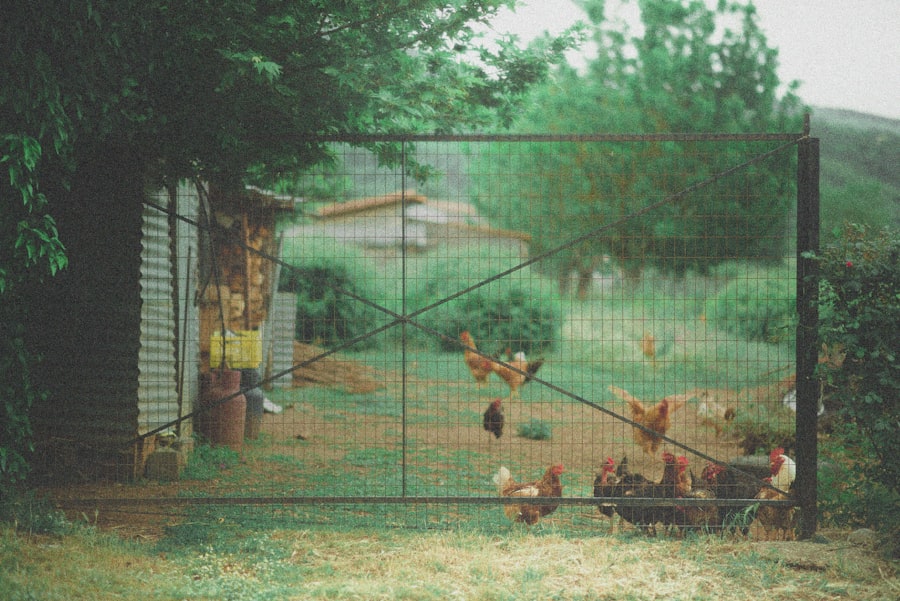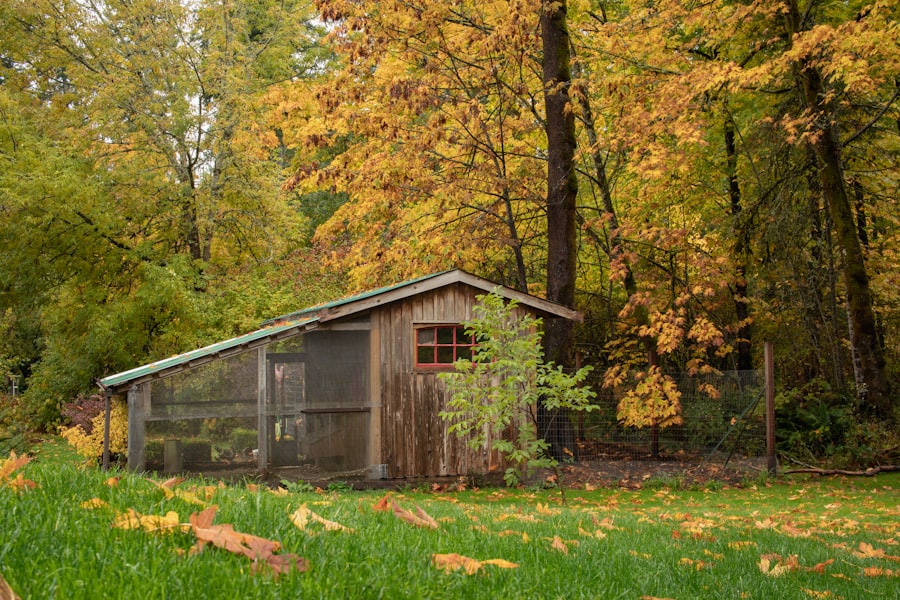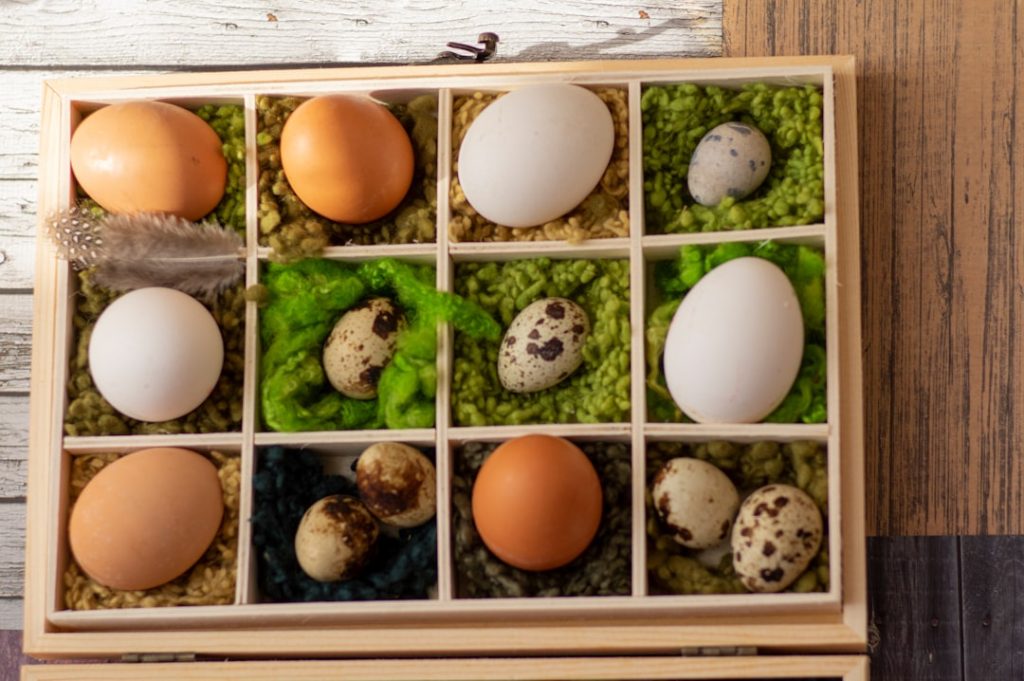When selecting a chicken coop, several key factors should be considered. The size of the coop is crucial, with a recommended space allocation of 2-3 square feet per chicken inside the coop and 8-10 square feet per chicken in the outdoor run. This ensures adequate space for natural behaviors and movement.
The construction materials are also important. The coop should be built with sturdy, predator-resistant materials such as wood or metal to provide sufficient protection for the flock. Materials that can be easily damaged by predators should be avoided.
Proper ventilation is essential for maintaining air quality and preventing respiratory issues in chickens. A well-designed coop should include windows or vents that can be adjusted to regulate airflow. The coop’s layout and placement within the existing space should be carefully considered.
Factors to evaluate include the coop’s location relative to the house, garden, and other outdoor areas, as well as ease of access for cleaning, egg collection, and maintenance. While not the primary concern, the aesthetic appeal of the coop can be taken into account. A well-designed coop can enhance the visual appeal of a backyard while providing a safe and comfortable environment for chickens.
Table of Contents
Key Takeaways
- When choosing a coop, consider the size, ventilation, and predator protection to ensure the safety and comfort of your chickens.
- Provide a balanced diet for your chickens, including a mix of grains, protein, and fresh fruits and vegetables, to ensure their optimal health and nutrition.
- Regularly clean and disinfect the coop to prevent the spread of diseases and parasites among your flock.
- Install secure fencing and locks to protect your chickens from predators and theft, and consider installing a security camera for added protection.
- Collect eggs daily and store them in a cool, dry place to maintain their freshness, and wash them before use to remove any dirt or bacteria.
Feeding and Nutrition
Choosing the Right Feed
A good quality commercial chicken feed is a great place to start, as it will provide the essential vitamins, minerals, and protein that your chickens need to thrive. You can choose from a variety of different types of feed, including pellets, crumbles, and mash, depending on your chickens’ preferences and your own feeding routine.
Providing Fresh Water and Treats
In addition to commercial feed, it’s important to provide your chickens with access to fresh water at all times. Chickens can drink a surprising amount of water, especially in hot weather or when laying eggs, so be sure to check their water supply regularly and keep it clean and free of debris. You can also supplement your chickens’ diet with treats like fruits, vegetables, and mealworms. These treats can provide additional nutrients and help keep your chickens entertained and engaged.
Developing a Feeding Routine
Finally, it’s important to consider the feeding routine for your flock. Some chicken keepers prefer to free-range their birds, allowing them to forage for insects and plants in addition to their regular feed. Others may choose to keep their chickens in a run or enclosed area and provide all of their food in the form of commercial feed and treats. Whatever feeding routine you choose, be sure to monitor your chickens’ health and adjust their diet as needed to ensure they are getting the nutrition they need.
Health and Hygiene

Maintaining good health and hygiene practices is essential for keeping your chickens happy and disease-free. One of the most important aspects of chicken health is cleanliness. Regularly cleaning the coop and outdoor run will help prevent the buildup of bacteria and parasites that can lead to illness in your flock.
This includes removing soiled bedding, droppings, and any uneaten food on a regular basis. Additionally, you’ll want to regularly disinfect the coop and nesting boxes to kill any harmful pathogens. In addition to cleanliness, it’s important to monitor your chickens for signs of illness or injury.
This includes checking for any changes in behavior, appetite, or egg production, as well as keeping an eye out for any physical symptoms like sneezing, coughing, or limping. If you notice any signs of illness or injury in your flock, it’s important to take action quickly by isolating the affected birds and seeking advice from a veterinarian if necessary. Another important aspect of maintaining good chicken health is providing regular access to dust baths.
Dust bathing is a natural behavior for chickens that helps them keep their feathers clean and free of parasites. You can provide a dust bath area in the form of a shallow box filled with sand or diatomaceous earth, or simply allow your chickens access to a dry, dusty area in their outdoor run.
Safety and Security
Ensuring the safety and security of your flock is crucial for protecting them from predators and other potential dangers. One of the most important aspects of chicken safety is predator-proofing the coop and outdoor run. This includes using sturdy materials like hardware cloth or welded wire to cover all openings and prevent predators from gaining access to your chickens.
Additionally, be sure to secure all doors and latches with locks or clips that are resistant to tampering by raccoons, foxes, or other predators. In addition to predator-proofing, it’s important to consider other potential safety hazards in your chicken’s environment. This includes removing any toxic plants from their outdoor run, securing any loose wires or cables that could pose a strangulation risk, and ensuring that there are no sharp objects or potential choking hazards within reach of your flock.
Finally, it’s important to consider the safety of your chickens during extreme weather conditions. This includes providing adequate shelter from sun, wind, rain, and snow, as well as ensuring that their water supply does not freeze in cold weather. Additionally, be sure to monitor your flock during extreme weather events like storms or heatwaves and take action as needed to ensure their safety and comfort.
Egg Collection and Handling
Collecting and handling eggs is an important aspect of chicken keeping that requires careful attention to hygiene and food safety practices. When collecting eggs from your flock, it’s important to do so regularly to prevent them from becoming soiled or damaged. This will also help prevent broody hens from accumulating too many eggs in their nesting boxes.
When handling eggs, it’s important to wash your hands thoroughly before and after collecting them to prevent the spread of bacteria. Additionally, be sure to handle eggs gently to prevent cracking or breaking the shells. If you notice any eggs that are cracked or soiled with feces or dirt, be sure to discard them rather than attempting to clean them for consumption.
Once collected, eggs should be stored in a cool, dry place away from direct sunlight. This will help preserve their freshness and prevent them from spoiling prematurely. If you plan to consume the eggs yourself, be sure to use them within a reasonable timeframe to ensure they are at their best quality.

One way to promote socialization among your chickens is by providing ample space for them to move around freely both inside the coop and in their outdoor run. This allows them to establish a pecking order and engage in natural behaviors like dust bathing, scratching, and foraging for insects. Additionally, introducing new birds to an existing flock gradually and providing plenty of roosting space ensures each bird has a comfortable place to rest at night.
Enrichment Activities for Entertainment
Enrichment activities can keep your chickens entertained and engaged. This can be achieved by providing perches or platforms for them to roost on during the day, hanging treats or toys from the ceiling of the coop or run, or scattering scratch grains or mealworms for them to find.
Reducing Stress and Boredom
By incorporating socialization and enrichment activities into your chickens’ daily routine, you can help reduce stress and boredom in your flock. This, in turn, can lead to a happier and healthier flock.
Legal and Zoning Considerations
Before starting a backyard chicken flock, it’s important to familiarize yourself with any legal or zoning considerations that may apply in your area. Some municipalities have specific regulations regarding the number of chickens allowed per property, as well as restrictions on coop size, placement, and appearance. Additionally, some homeowners’ associations may have their own rules regarding backyard chickens that you’ll need to be aware of before getting started.
Before bringing home your first flock of chickens, be sure to research any local regulations that may apply in your area and ensure that you are in compliance with all relevant laws and ordinances. By taking the time to understand these legal considerations upfront, you can avoid potential conflicts with neighbors or local authorities down the road and ensure a smooth and enjoyable experience as a backyard chicken keeper.
If you’re interested in learning more about what to feed ducks, check out this article on Poultry Wizard. It provides essential information on the best diet for ducks to keep them healthy and thriving.
FAQs
What are the essentials for keeping chickens?
The essentials for keeping chickens include a suitable coop, proper nutrition, access to fresh water, and protection from predators.
What type of coop is suitable for chickens?
A suitable coop for chickens should provide enough space for the number of chickens you have, be well-ventilated, have nesting boxes for egg-laying, and be predator-proof.
What kind of nutrition do chickens need?
Chickens need a balanced diet that includes a good quality chicken feed, as well as access to grit for digestion and occasional treats such as fruits and vegetables.
How much water do chickens need?
Chickens need access to fresh, clean water at all times. They can drink up to 1/2 to 1 cup of water per day, depending on the weather and their size.
How can I protect my chickens from predators?
To protect chickens from predators, it’s important to secure the coop with sturdy fencing, lock the coop at night, and use deterrents such as motion-activated lights or sound devices.
Meet Walter, the feathered-friend fanatic of Florida! Nestled in the sunshine state, Walter struts through life with his feathered companions, clucking his way to happiness. With a coop that’s fancier than a five-star hotel, he’s the Don Juan of the chicken world. When he’s not teaching his hens to do the cha-cha, you’ll find him in a heated debate with his prized rooster, Sir Clucks-a-Lot. Walter’s poultry passion is no yolk; he’s the sunny-side-up guy you never knew you needed in your flock of friends!







